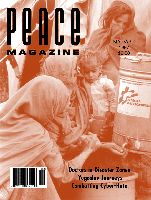
Peace Magazine Mar-Apr 1997, page 31. Some rights reserved.
Search for other articles by Lara Paul here
Directed by Sergei Bodrov. Screenplay by Arif Aliev, Sergei Bodrov and Boris Giller.
The story is drawn from Prisoner of the Caucasus, which Tolstoy wrote after serving in the Russian army in Chechnya 150 years ago, and is reset in recent times. Nineteenth-century origins notwithstanding, Prisoner of the Mountains is a very modern feeling film, much more so than any other Russian film I've seen. This is particularly noticeable in the opening scene, with its contemporary Western, slightly surreal, sensibility. After its arresting introduction, the film follows a strong, simple story-line and unfolds with warmth and humor despite its subject. It also succeeds in a classical format without being entirely predictable.
The great success of Prisoner of the Mountains is that it brings a human face to the conflict in Chechnya. Two Russian soldiers, a seasoned fighter (Sasha) and a new recruit (Vanya), are captured by a Chechen villager (Abdul). Abdul hopes to trade the two for his beloved son, who has been imprisoned by the Russian army. As the characters of the soldiers and the villagers develop, the "enemies" come to appreciate one another, just as we the audience empathize with the main players on both sides. The exception to this is the local Russian commander, a caricature thrown into an otherwise sensitive film. Other characters include Vanya's mother, a mute Chechen guard (whose tongue was cut out in a Siberian camp), and the villager's pre-pubescent daughter who becomes especially attached to the young prisoner.
The film is beautifully shot in the breathtaking hills of Dagestan, just hours east of Chechnya. The soundtrack is equally effective, mostly folk music and an army song, with some of the lyrics translated for the benefit of an anglophone audience. Bodrov, a well-known filmmaker, recounted the following anecdote before the screening: "During the filming I was held prisoner by my own bodyguards when they learned that the star of the film was making more money than they were. Because she is a woman. Chechnya is such a backwards place."
The audience was also warned by a sponsor that the film would be edifying rather than enjoyable. I enjoyed it despite its tragedy. Though there are moments of violence, none are gratuitous, and the viewer is given plenty of relief in between. Highly recommended.
Reviewed by Lara Paul, Managing Editor of Peace Magazine.

Peace Magazine Mar-Apr 1997, page 31. Some rights reserved.
Search for other articles by Lara Paul here